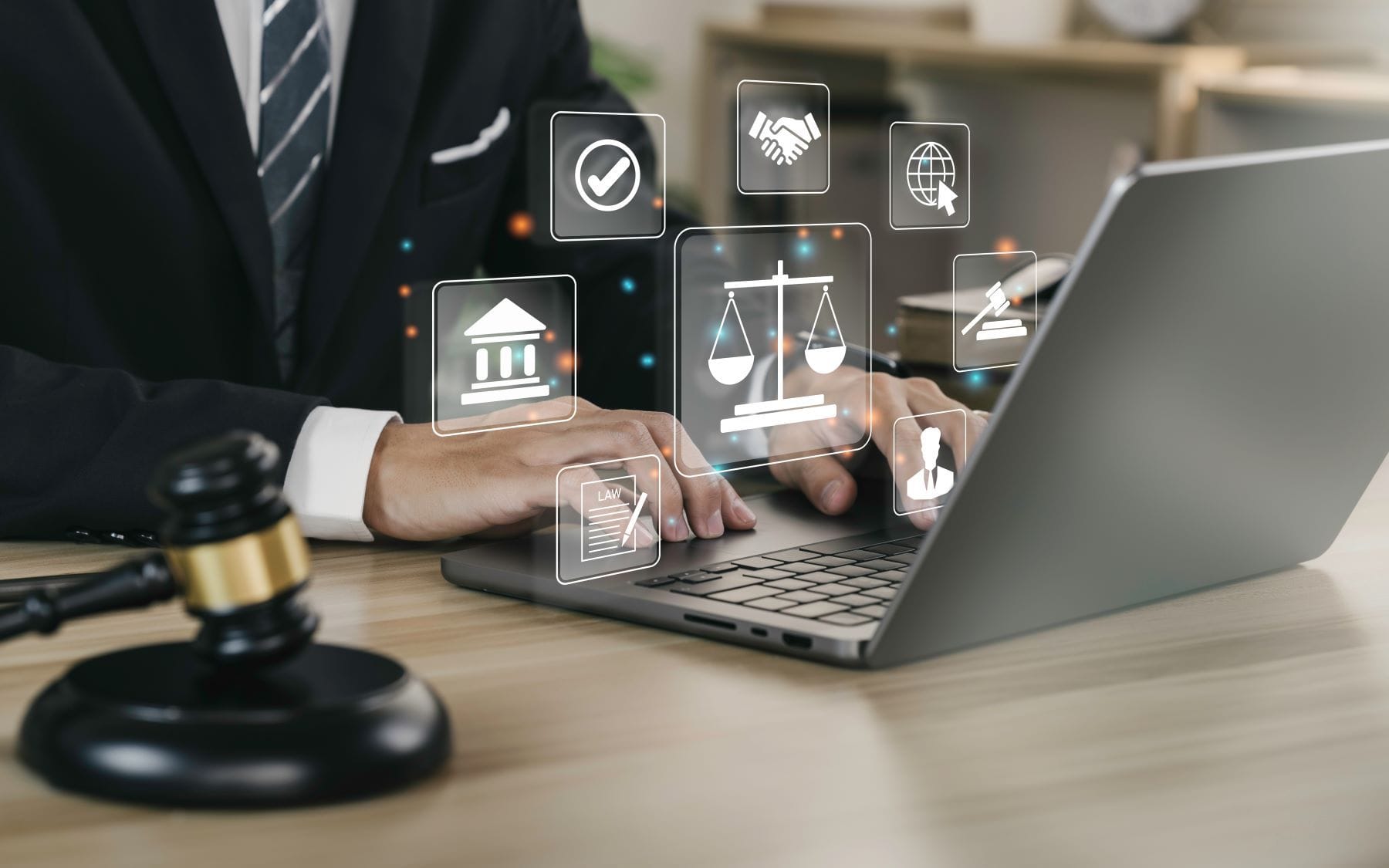What is Legal Technology? And How to Implement It at Your Firm
From the emergence of fax machines to computers, from e-filing to e-discovery, new technologies in the legal industry are always both transformative and controversial. At its best, technology allows attorneys to focus less on administrative tasks and more on strategic thinking. As the digital world continues to evolve and provide new tools, embracing new legal technologies, including artificial intelligence tools, has become imperative for legal professionals across practice areas to improve their efficiency, accuracy, and client services.
Updated on
What is Legal Technology?
Legal technology, or “legal tech,” encompasses software and tools designed to support and enhance the practice of law. These technologies streamline, automate, and improve legal processes, making them more efficient, cost-effective, and accessible.
Key tools include:
- Case Management Systems
- Document Automation
- Electronic Discovery
- Practice and Billing Management
- Generative AI and Machine Learning
How is Technology Changing The Legal Industry?
Technology is reshaping the legal industry by enhancing efficiency and expanding service methods. Key developments include remote work, virtual proceedings, and AI integration, each introducing new opportunities and challenges for legal professionals.
Remote Work in Law Firms
Before COVID-19, remote or hybrid work models were rare. As of 2024, only 11% of law firms are fully in-office. The surge in remote work has led to an increase in tech tools, such as video conferencing software with AI for transcription and note-taking, calendar tools, communication applications, and case management tools.
The Impact of Virtual Proceedings

Once unthinkable in the legal profession, virtual depositions, hearings, and even trials are now being conducted online regularly. Immigration hearings are authorized to be held via the internet. Jury trials have also been conducted over Zoom.
Remote criminal trials raise significant constitutional issues as well as accessibility problems for low income defendants, but advocates say they can help relieve a backlogged criminal legal system where defendants remain in jail for too long.
Civil bench trials have become common in some jurisdictions, and some high-profile civil jury trials have also been conducted remotely. One early pandemic example from Florida resulted in a $411 million jury verdict for a man paralyzed in a motorcycle accident, the largest remote jury verdict to date.
Attorneys, judges, and other legal professionals say there are pros and cons to litigating virtually. One survey of legal professionals suggested that jurors are more engaged in a trial when they do not need to worry about the logistics of getting to court. On the other hand, Zoom fatigue can be an issue, and attorneys should prepare strategies to keep the jury engaged.
In 2021, the NY Courts Future of Trials Working Group issued a report with recommendations on the use of technology, including guiding principles, aspects of trial impacted by technology, and best practices for remote trials.
Virtual depositions and hearings are even more common, with many routine depositions now conducted remotely. Trials often include video testimony. Attorneys should work with their experts to prepare them for remote depositions, where facial expressions and body language may be more readily misunderstood.
Implementing Legal Tech Into Your Practice, Today
Case Management
Case management tools like Clio and Filevine, among others, enable legal professionals to streamline document management, client services, and billing processes. Through cloud-based platforms, attorneys can securely share files, collaborate with colleagues, and track billable hours seamlessly.
File Sharing Tools
File-sharing tools have become indispensable assets for legal professionals, facilitating secure and efficient data exchange. Many legal professionals use file-sharing programs through their case management software or use trusted software like Dropbox or Box.com.
Legal teams are responsible for implementing rigorous security measures and encryption protocols to safeguard sensitive client information, adhere to data privacy regulations, and mitigate cybersecurity risks.
These concerns implicate a number of professional conduct rules, as state bars have responded to the proliferation of technology directly by adopting new rules and requiring attorneys to take continuing education on technology. In 2014, a Lexis Nexis report found that many law firm employees were using free file-sharing tools, potentially putting clients at risk of confidential data breach.
As long as attorneys and law firms are aware of these risks, adopt strong cybersecurity policies, and use authorized file-sharing programs, the client experience is enhanced by the ability to quickly and easily share and sign documents.
Billing and Tracking Software
Legal billing software helps lawyers increase revenue in a number of ways. Lawyers save time tracking hours, sending invoices, and following up with clients for late payments. Online payment systems put a barrier between the lawyer and the collections system, improving the client relationship.
When working with experts, the Expert Institute’s Expert IQ payments and invoices tool can help automate the billing process. In addition, the Fee Calculator helps attorneys plan for litigation expenses that can shape their trial strategy.
Artificial Intelligence
Artificial intelligence technologies are the current hot topic of the moment in legal technology. What we call “AI” includes several types of computer-assisted technology that mimics human intelligence.
Some of the most common are Machine Learning, which aids in research, transcription, note-taking, and discovery tasks, and Natural Language Processing/Large Language Models, which use algorithms to generate text. All these types of tech tools, used with care, can improve legal professionals’ efficiency.
Machine Learning Tools
Law firms have been using forms of machine learning called Technology Assisted Review for many years to automate e-discovery tasks. Other uses include transcriptions and summaries of large document libraries. The integration of AI in document management and legal research has revolutionized how legal professionals interact with information.
AI Medical Chronologies
Medical Chronologies can be incredibly helpful for your case, but the work involved in creating a comprehensive chronology based on a client’s records is immense. Instead of spending time and resources to create your own, a service like Expert Institute’s Medical Chronologies can take the work off your hands.
Our process is simple. All you have to do is submit your client’s medical records. From there, our AI technology uses Natural Language Processing (NLP) to analyze every page. For quality assurance, one of our in-house physicians will review the summary to check for any errors. From submission to delivery, the entire process takes just a few days, so you’ll have a completed chronology in your hands in no time.
AI-driven Expert Due Diligence
Expert Radar enhances expert witness due diligence for attorneys by systematically aggregating data from hundreds of sources and providing a thorough analysis in three primary areas:
- Litigation History: Analyzes court documents, expert challenges, and deposition transcripts.
- Risk & Credibility: Investigates disciplinary actions, social media presence, and malpractice claims.
- Professional Background: Reviews education, certifications, employment history, and clinical activity.
Leveraging AI, Expert Radar compiles detailed, searchable reports within the Expert iQ platform. Attorneys can utilize these reports to uncover conflicts of interest, contradictory statements, and other critical insights. This tool ensures a high level of accuracy and efficiency, saving legal teams countless hours and resources, ultimately enhancing case preparation and outcomes.
ChatGPT and Harvey.ai
The most well-known of these free generative AI tools is ChatGPT, but free tools are not well suited to most legal tasks, as one NY attorney sanctioned for citing fake case law learned the hard way. There are many legal-specific generative AI-powered tools, like Harvey.ai, that are trained on real legal documents and legal research databases.
These tools can both produce insights from case law and begin drafting simple legal documents. Of course, as with all technological efficiencies, thorough review and fact-checking is required.
How Should Law Schools Teach Technology?
As law firms adopt AI tools and other emerging technologies, so should law schools. Many legal research tools are already AI-driven, so libraries are often at the forefront of teaching this technology, but there is no shortage of interest in the topic elsewhere.
The concern by many legal educators and professionals is that students may use the tools as a shortcut, without understanding the need for careful review. On the other hand, law firms also say law graduates do not know enough about legal tech tools. One thing is certain – as every new class of lawyers is admitted to the bar, the technologies – and the practice of law - will keep evolving.
Frequently Asked Questions
What are the benefits of using legal technology in law firms?
Using legal technology in law firms enhances efficiency, reduces costs, and improves accessibility by streamlining and automating legal processes.
How can law firms implement legal tech solutions effectively?
Law firms can effectively implement legal tech solutions by adopting tools like case management systems, document automation, and billing software while ensuring robust cybersecurity measures and training staff on new technologies. Regular evaluation and updates of these systems will also help maintain efficiency and compliance with legal standards.
What types of legal technology tools are commonly used in the industry?
Common legal technology tools include Case Management Systems, Document Automation, Electronic Discovery, Practice and Billing Management, and Generative AI and Machine Learning.


